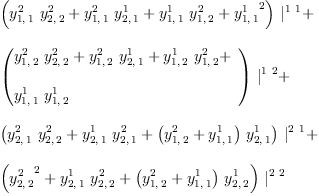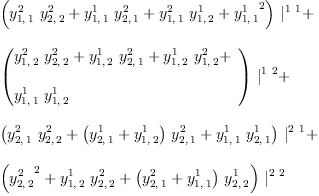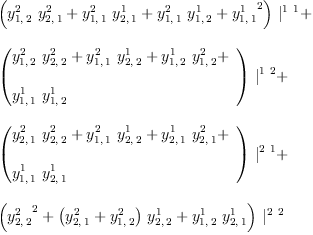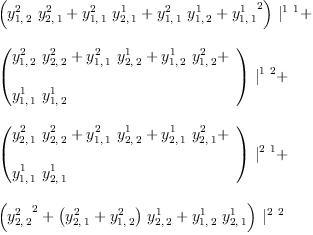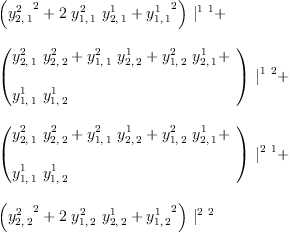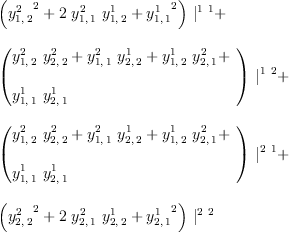References
See also:
2-d Example
Use LinearOperator (LOP)
fricas
(1) -> )lib CARTEN MONAL PROP LOP
CartesianTensor is now explicitly exposed in frame initial
CartesianTensor will be automatically loaded when needed from
/var/aw/var/LatexWiki/CARTEN.NRLIB/CARTEN
Monoidal is now explicitly exposed in frame initial
Monoidal will be automatically loaded when needed from
/var/aw/var/LatexWiki/MONAL.NRLIB/MONAL
Prop is now explicitly exposed in frame initial
Prop will be automatically loaded when needed from
/var/aw/var/LatexWiki/PROP.NRLIB/PROP
LinearOperator is now explicitly exposed in frame initial
LinearOperator will be automatically loaded when needed from
/var/aw/var/LatexWiki/LOP.NRLIB/LOP
L:=LOP(OVAR ['1,'2], EXPR INT)
Type: Type
fricas
-- basis
dx:=basisIn()$L
fricas
Dx:=basisOut()$L
fricas
-- summation
macro Σ(f,b,i) == reduce(+,[f*b.i for i in 1..#b])
Type: Void
fricas
-- identity
I:L:=[1]
fricas
-- twist
X:L:=[2,1]
fricas
-- co-evaluation
Λ:L:=co(1)
fricas
-- evaluation
V:L:=ev(1)
Algebra
An n-dimensional algebra is represented by a (2,1)-tensor
 viewed as a linear operator with two inputs
viewed as a linear operator with two inputs  and one
output
and one
output  . For example in 2 dimensions
. For example in 2 dimensions
fricas
Y:=Σ(Σ(Σ(script(y,[[i,j],[k]]),dx,i),dx,j),Dx,k)
Multiplication
Given two vectors  and
and 
fricas
P:=Σ(script(p,[[],[i]]),Dx,i)
fricas
Q:=Σ(script(q,[[],[i]]),Dx,i)
the tensor  operates on their tensor product to
yield a vector
operates on their tensor product to
yield a vector 
fricas
R:=(P,Q)/Y
Pictorially:
P Q
Y
R
or more explicitly
Pi Qj
\/
\
Rk
Associator
An algebra is said to be associative if:
Y = Y
Y Y
i j k i j k i j k
\ | / \/ / \ \/
\ | / \ / \ /
\|/ = e k - i e
| \/ \/
| \ /
l l l
This requires that the following (3,1)-tensor
(associator) is zero.
fricas
YY := (Y,I)/Y - (I,Y)/Y
Commutator
The algebra  is commutative if:
is commutative if:
Y = Y
i j i j j i
\ / = \/ - \/
| \ /
k k k
This requires that the following (2,1)-tensor
(commutator) is zero.
fricas
YC:=Y-(X/Y)
A basis for the ideal defined by the coefficients of the
commutator is given by:
fricas
groebner(ravel(YC))
There are 2 exposed and 6 unexposed library operations named
groebner having 1 argument(s) but none was determined to be
applicable. Use HyperDoc Browse, or issue
)display op groebner
to learn more about the available operations. Perhaps
package-calling the operation or using coercions on the arguments
will allow you to apply the operation.
Cannot find a definition or applicable library operation named
groebner with argument type(s)
List(Expression(Integer))
Perhaps you should use "@" to indicate the required return type,
or "$" to specify which version of the function you need.
Anti-commutator
The algebra  is anti-commutative if:
is anti-commutative if:
Y = -Y
i j i j j i
\ / = \/ = \/
| \ /
k k k
This requires that the following (2,1)-tensor
(anti-commutator) is zero.
fricas
YA:=Y+(X/Y)
A basis for the ideal defined by the coefficients of the
commutator is given by:
fricas
groebner(ravel(YA))
There are 2 exposed and 6 unexposed library operations named
groebner having 1 argument(s) but none was determined to be
applicable. Use HyperDoc Browse, or issue
)display op groebner
to learn more about the available operations. Perhaps
package-calling the operation or using coercions on the arguments
will allow you to apply the operation.
Cannot find a definition or applicable library operation named
groebner with argument type(s)
List(Expression(Integer))
Perhaps you should use "@" to indicate the required return type,
or "$" to specify which version of the function you need.
Jacobi
The Jacobi identity is:
X
Y = Y + Y
Y Y Y
i j k i j k i j k i j k
\ | / \ / / \ \ / \ \ /
\ | / \ / / \ \ / \ 0
\ | / \/ / \ \/ \/ \
\ | / \ / \ / \ \
\|/ = e k - i e - e j
| \/ \/ \/
| \ / /
l l l l
An algebra satisfies the Jacobi identity if and only if
the following (3,1)-tensor
is zero.
fricas
YX := YY - (I,X)/(Y,I)/Y
Scalar Product
A scalar product is denoted by the (2,0)-tensor

fricas
U:=Σ(Σ(script(u,[[],[i,j]]),dx,i),dx,j)
Definition 1
We say that the scalar product is associative if the tensor
equation holds:
Y = Y
U U
In other words, if the (3,0)-tensor:
i j k i j k i j k
\ | / \/ / \ \/
\|/ = \ / - \ /
0 0 0
(three-point function) is zero.
fricas
YU := (Y,I)/U - (I,Y)/U
Definition 2
An algebra with a non-degenerate associative scalar product
is called pre-Frobenius.
We may consider the problem where multiplication Y is given,
and look for all associative scalar products  or we
may consider an scalar product U as given, and look for all
algebras
or we
may consider an scalar product U as given, and look for all
algebras  such that the scalar product is associative.
such that the scalar product is associative.
This problem can be solved using linear algebra.
fricas
)expose MCALCFN
MultiVariableCalculusFunctions is now explicitly exposed in frame
initial
K := jacobian(ravel(YU),concat(map(variables,ravel(Y)))::List Symbol);
Type: Matrix(Expression(Integer))
fricas
yy := transpose matrix [concat(map(variables,ravel(Y)))::List Symbol];
Type: Matrix(Polynomial(Integer))
fricas
K::OutputForm * yy::OutputForm = 0
Type: Equation(OutputForm
?)
The matrix K transforms the coefficients of the tensor  into coefficients of the tensor
into coefficients of the tensor  . We are looking for
coefficients of the tensor
. We are looking for
coefficients of the tensor  such that
such that K transforms the
tensor  into
into  for any
for any  .
.
A necessary condition for the equation to have a non-trivial
solution is that the matrix K be degenerate.
Theorem 1
All 2-dimensional pre-Frobenius algebras are symmetric.
Proof: Consider the determinant of the matrix K above.
fricas
Kd := factor(determinant(K)::DMP(concat map(variables,ravel(U)),FRAC INT))
Type: Factored(DistributedMultivariatePolynomial
?([u[;1,
1],
u[;1,
2],
u[;2,
1],
u[;2,
2]],
Fraction(Integer)))
The scalar product must also be non-degenerate
fricas
Ud:DMP(concat map(variables,ravel(U)),FRAC INT) := determinant [[retract((Dx.i,Dx.j)/U) for j in 1..#Dx] for i in 1..#Dx]
Type: DistributedMultivariatePolynomial
?([u[;1,
1],
u[;1,
2],
u[;2,
1],
u[;2,
2]],
Fraction(Integer))
therefore U must be symmetric.
fricas
nthFactor(Kd,1)
There are no exposed library operations named nthFactor but there
are 3 unexposed operations with that name. Use HyperDoc Browse or
issue
)display op nthFactor
to learn more about the available operations.
Cannot find a definition or applicable library operation named
nthFactor with argument type(s)
Factored(DistributedMultivariatePolynomial([u[;1,1],u[;1,2],u[;2,1],u[;2,2]],Fraction(Integer)))
PositiveInteger
Perhaps you should use "@" to indicate the required return type,
or "$" to specify which version of the function you need.
Theorem 2
All 2-dimensional algebras with associative scalar product
are commutative.
Proof: The basis of the null space of the symmetric
K matrix are all symmetric
fricas
YUS := (I,Y)/US - (Y,I)/US
There are 15 exposed and 15 unexposed library operations named /
having 2 argument(s) but none was determined to be applicable.
Use HyperDoc Browse, or issue
)display op /
to learn more about the available operations. Perhaps
package-calling the operation or using coercions on the arguments
will allow you to apply the operation.
Cannot find a definition or applicable library operation named /
with argument type(s)
Tuple(LinearOperator(OrderedVariableList([1,2]),Expression(Integer)))
Variable(US)
Perhaps you should use "@" to indicate the required return type,
or "$" to specify which version of the function you need.
This defines a 4-parameter family of 2-d pre-Frobenius algebras
fricas
test(eval(YUS,SS)=0*YUS)
There are 10 exposed and 6 unexposed library operations named eval
having 2 argument(s) but none was determined to be applicable.
Use HyperDoc Browse, or issue
)display op eval
to learn more about the available operations. Perhaps
package-calling the operation or using coercions on the arguments
will allow you to apply the operation.
Cannot find a definition or applicable library operation named eval
with argument type(s)
Variable(YUS)
Variable(SS)
Perhaps you should use "@" to indicate the required return type,
or "$" to specify which version of the function you need.
Alternatively we may consider
fricas
J := jacobian(ravel(YU),concat(map(variables,ravel(U)))::List Symbol);
Type: Matrix(Expression(Integer))
fricas
uu := transpose matrix [concat(map(variables,ravel(U)))::List Symbol];
Type: Matrix(Polynomial(Integer))
fricas
J::OutputForm * uu::OutputForm = 0
Type: Equation(OutputForm
?)
The matrix J transforms the coefficients of the tensor  into coefficients of the tensor
into coefficients of the tensor  . We are looking for
coefficients of the tensor
. We are looking for
coefficients of the tensor  such that
such that J transforms the
tensor  into
into  for any
for any  .
.
A necessary condition for the equation to have a non-trivial
solution is that all 70 of the 4x4 sub-matrices of J are
degenerate. To this end we can form the polynomial ideal of
the determinants of these sub-matrices.
fricas
JP:=ideal concat concat concat
[[[[ determinant(
matrix([row(J,i1),row(J,i2),row(J,i3),row(J,i4)]))::FRAC POLY INT
for i4 in (i3+1)..maxRowIndex(J) ]
for i3 in (i2+1)..(maxRowIndex(J)-1) ]
for i2 in (i1+1)..(maxRowIndex(J)-2) ]
for i1 in minRowIndex(J)..(maxRowIndex(J)-3) ];
Type: PolynomialIdeal
?(Fraction(Integer),
IndexedExponents
?(Symbol),
Symbol,
Polynomial(Fraction(Integer)))
fricas
#generators(%)
Theorem 3
If a 2-d algebra is associative, commutative, anti-commutative
or if it satisfies the Jacobi identity then it is a
pre-Frobenius algebra.
Proof
Consider the ideals of the associator, commutator, anti-commutator
and Jacobi identity
fricas
YYI:=ideal(ravel(YY)::List FRAC POLY INT);
Type: PolynomialIdeal
?(Fraction(Integer),
IndexedExponents
?(Symbol),
Symbol,
Polynomial(Fraction(Integer)))
fricas
in?(JP,YYI) -- associative
Type: Boolean
fricas
YCI:=ideal(ravel(YC)::List FRAC POLY INT);
Type: PolynomialIdeal
?(Fraction(Integer),
IndexedExponents
?(Symbol),
Symbol,
Polynomial(Fraction(Integer)))
fricas
in?(JP,YCI) -- commutative
Type: Boolean
fricas
YAI:=ideal(ravel(YA)::List FRAC POLY INT);
Type: PolynomialIdeal
?(Fraction(Integer),
IndexedExponents
?(Symbol),
Symbol,
Polynomial(Fraction(Integer)))
fricas
in?(JP,YAI) -- anti-commutative
Type: Boolean
fricas
YXI:=ideal(ravel(YX)::List FRAC POLY INT);
Type: PolynomialIdeal
?(Fraction(Integer),
IndexedExponents
?(Symbol),
Symbol,
Polynomial(Fraction(Integer)))
fricas
in?(JP,YXI) -- Jacobi identity
Type: Boolean
Y-forms
Three traces of two graftings of an algebra gives six
(2,0)-forms.
Left snail and right snail:
LS RS
Y /\ /\ Y
Y ) ( Y
\/ \/
i j j i
\/ \/
\ /\ /\ /
e f \ / f e
\/ \ / \/
\ / \ /
f / \ f
\/ \/
fricas
LS:=
( Y Λ )/ _
( Y I )/ _
V
fricas
RS:=
( Λ Y )/ _
( I Y )/ _
V
fricas
test(LS=RS)
Type: Boolean
Left and right deer:
RD LD
\ /\/ \/\ /
Y /\ /\ Y
Y ) ( Y
\/ \/
i j i j
\ /\ / \ /\ /
\ f \ / \ / f /
\/ \/ \/ \/
\ /\ /\ /
e / \ / \ e
\/ \ / \/
\ / \ /
f / \ f
\/ \/
Left and right deer forms are identical but different from snails.
fricas
RD:=
( I Λ I ) / _
( Y X ) / _
( Y I ) / _
V
fricas
LD:=
( I Λ I ) / _
( X Y ) / _
( I Y ) / _
V
fricas
test(LD=RD)
Type: Boolean
fricas
test(RD=RS)
Type: Boolean
fricas
test(RD=LS)
Type: Boolean
Left and right turtles:
RT LT
/\ / / \ \ /\
( Y / \ Y )
\ Y Y /
\/ \/
i j i j
/\ / / \ \ /\
/ f / / \ \ f \
/ \/ / \ \/ \
\ \ / \ / /
\ e / \ e /
\ \/ \/ /
\ / \ /
\ f f /
\/ \/
fricas
RT:=
( Λ I I ) / _
( I Y I ) / _
( I Y ) / _
V
fricas
LT:=
( I I Λ ) / _
( I Y I ) / _
( Y I ) / _
V
fricas
test(LT=RT)
Type: Boolean
The turles are symmetric
fricas
test(RT = X/RT)
Type: Boolean
fricas
test(LT = X/LT)
Type: Boolean
Five of the six forms are independent.
fricas
test(RT=RS)
Type: Boolean
fricas
test(RT=LS)
Type: Boolean
fricas
test(RT=RD)
Type: Boolean
fricas
test(LT=RS)
Type: Boolean
fricas
test(LT=LS)
Type: Boolean
fricas
test(LT=RD)
Type: Boolean
Associativity implies right turtle equals right snail
and left turtle equals left snail.
fricas
in?(ideal(ravel(RT-RS)::List FRAC POLY INT),YYI)
Type: Boolean
fricas
in?(ideal(ravel(LT-LS)::List FRAC POLY INT),YYI)
Type: Boolean
If the Jacobi identity holds then both snails are zero
fricas
in?(ideal(ravel(RS)::List FRAC POLY INT),YXI)
Type: Boolean
fricas
in?(ideal(ravel(LS)::List FRAC POLY INT),YXI)
Type: Boolean
and right turtle and deer have opposite signs
fricas
in?(ideal(ravel(RT+RD)::List FRAC POLY INT),YXI)
Type: Boolean
![]() viewed as a linear operator with two inputs
viewed as a linear operator with two inputs ![]() and one
output
and one
output ![]() . For example in 2 dimensions
. For example in 2 dimensions
![]() and
and ![]()
![]() operates on their tensor product to
yield a vector
operates on their tensor product to
yield a vector ![]()

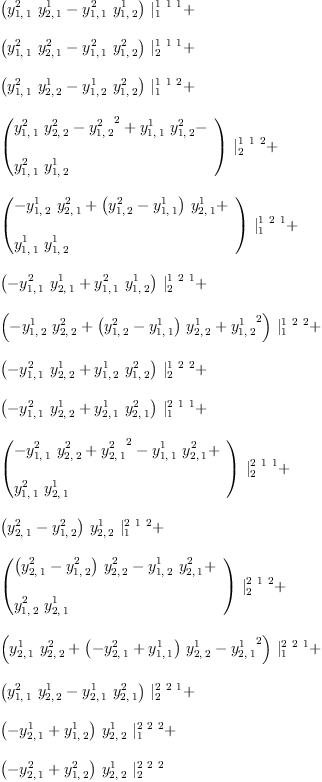
![]() is commutative if:
is commutative if:

![]() is anti-commutative if:
is anti-commutative if:

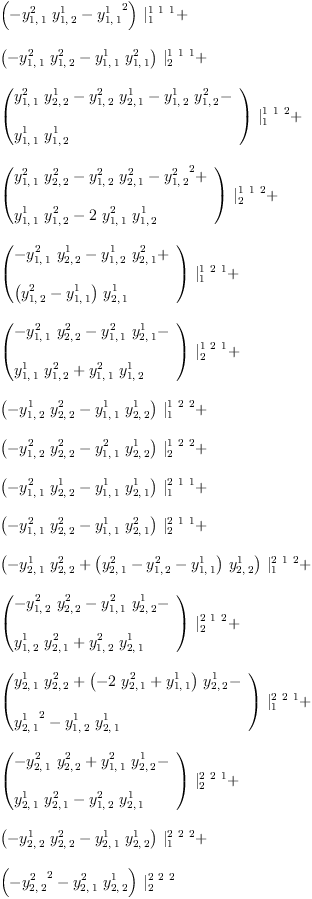
![]()
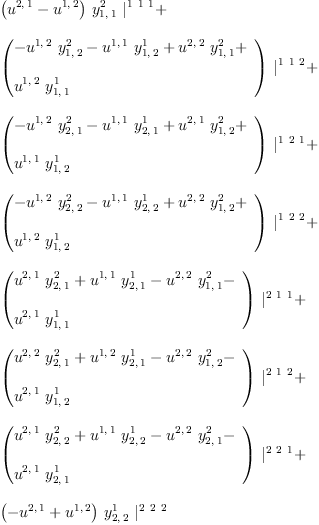
![]() or we
may consider an scalar product U as given, and look for all
algebras
or we
may consider an scalar product U as given, and look for all
algebras ![]() such that the scalar product is associative.
such that the scalar product is associative. 
![]() into coefficients of the tensor
into coefficients of the tensor ![]() . We are looking for
coefficients of the tensor
. We are looking for
coefficients of the tensor ![]() such that
such that ![]() into
into ![]() for any
for any ![]() .
.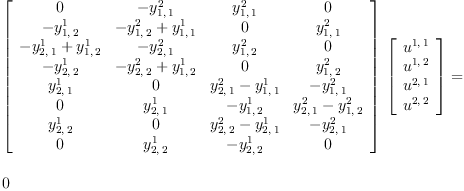
![]() into coefficients of the tensor
into coefficients of the tensor ![]() . We are looking for
coefficients of the tensor
. We are looking for
coefficients of the tensor ![]() such that
such that ![]() into
into ![]() for any
for any ![]() .
.